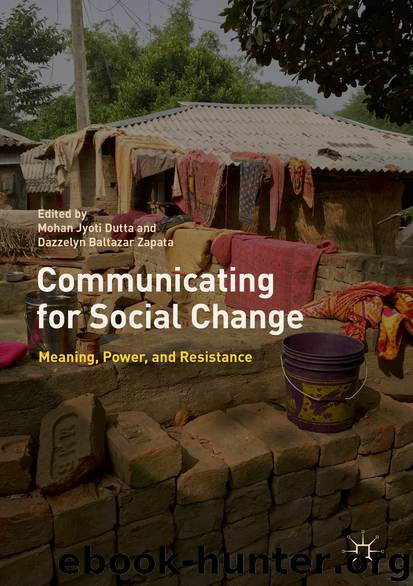Communicating for Social Change by Mohan Jyoti Dutta & Dazzelyn Baltazar Zapata

Author:Mohan Jyoti Dutta & Dazzelyn Baltazar Zapata
Language: eng
Format: epub
ISBN: 9789811320057
Publisher: Springer Singapore
On Authority and “Learned Helplessness:” The Story of Lider Palay
I met him when we were being introduced around the community. Lider Palay 4 welcomed us with a smile. He is in his early 40s, a farmer, and leader of the farmer cooperative. He asked us to come by his house late in the afternoon. He welcomed us warmly in his house.
Of all the tribe members I have spoken with, Lider Palay was the most accommodating of all. He told stories beyond what we asked for. He would smile, joke, and laugh with us. We did not feel like outsiders. Like all my participants, I asked him of his participation in community gatherings.
“In the assembly, do you speak up?”
His answer was not I expected it to be. “No I don’t. The governing body is already there, they will speak for us,” he said.
I followed up on it. “They will be the one in charge?”
“Yes, for what should be said and what is right and just,” telling us that they rely on authority to voice out concerns of the community.
His answer baffled me. As a leader, I thought he was passionate in expressing what he thinks in any venue he was in. I was expecting an answer, a proactive one different from other participants. Before we left, he said something that tickled my mind to think about marginalized communities, if I may classify them as one.
“Come back here when you graduate and become successful. We need help. The community needs help. You are intelligent and I know you will be successful someday. We need people like you. Do not forget us.”
Two years have passed. I have not visited the community since then. Guilt overcomes my whole being as I retell this moment with Lider Palay. It takes me back to another moment, more than a year after this request has been made, when a student asked me what my undergraduate thesis did to help my Alangan Mangyan community.
Lider Palay surprised me the most—despite being a leader, he surrendered his place in the conversation by entrusting the leaders on the authority of what is right and just for the whole tribe. Even with their shared experiences on “engaging” community consultation, if I may describe it as one, they have varying levels of public membership: visibility, presence, and action. Lider Palay, however, did not transcend to the highest level of public membership—he is aware of the issues, but refuses to speak out for himself. This led me to question how open the dialogue is for the communities—does the indigenous presence of the public sphere (barely a member of the mainstream public sphere) foster the spirit of participation or unconsciously impose silence on mere members?
Download
This site does not store any files on its server. We only index and link to content provided by other sites. Please contact the content providers to delete copyright contents if any and email us, we'll remove relevant links or contents immediately.
| Arms Control | Diplomacy |
| Security | Trades & Tariffs |
| Treaties | African |
| Asian | Australian & Oceanian |
| Canadian | Caribbean & Latin American |
| European | Middle Eastern |
| Russian & Former Soviet Union |
The Secret History by Donna Tartt(19053)
The Social Justice Warrior Handbook by Lisa De Pasquale(12187)
Thirteen Reasons Why by Jay Asher(8893)
This Is How You Lose Her by Junot Diaz(6877)
Weapons of Math Destruction by Cathy O'Neil(6265)
Zero to One by Peter Thiel(5786)
Beartown by Fredrik Backman(5737)
The Myth of the Strong Leader by Archie Brown(5500)
The Fire Next Time by James Baldwin(5431)
How Democracies Die by Steven Levitsky & Daniel Ziblatt(5215)
Promise Me, Dad by Joe Biden(5141)
Stone's Rules by Roger Stone(5081)
A Higher Loyalty: Truth, Lies, and Leadership by James Comey(4954)
100 Deadly Skills by Clint Emerson(4921)
Rise and Kill First by Ronen Bergman(4779)
Secrecy World by Jake Bernstein(4741)
The David Icke Guide to the Global Conspiracy (and how to end it) by David Icke(4708)
The Farm by Tom Rob Smith(4502)
The Doomsday Machine by Daniel Ellsberg(4484)
